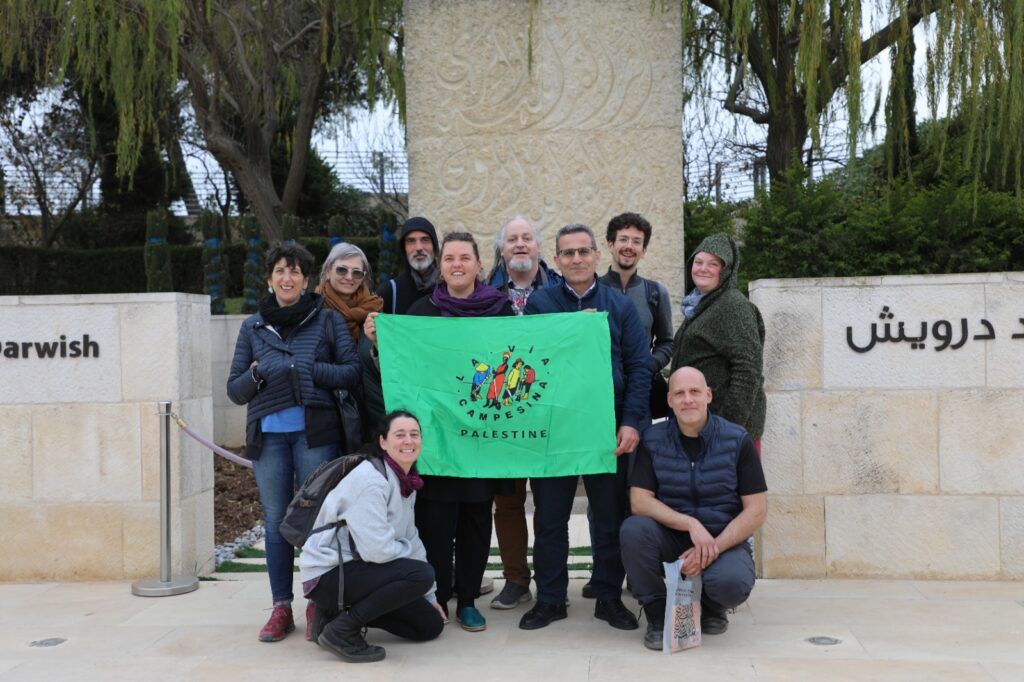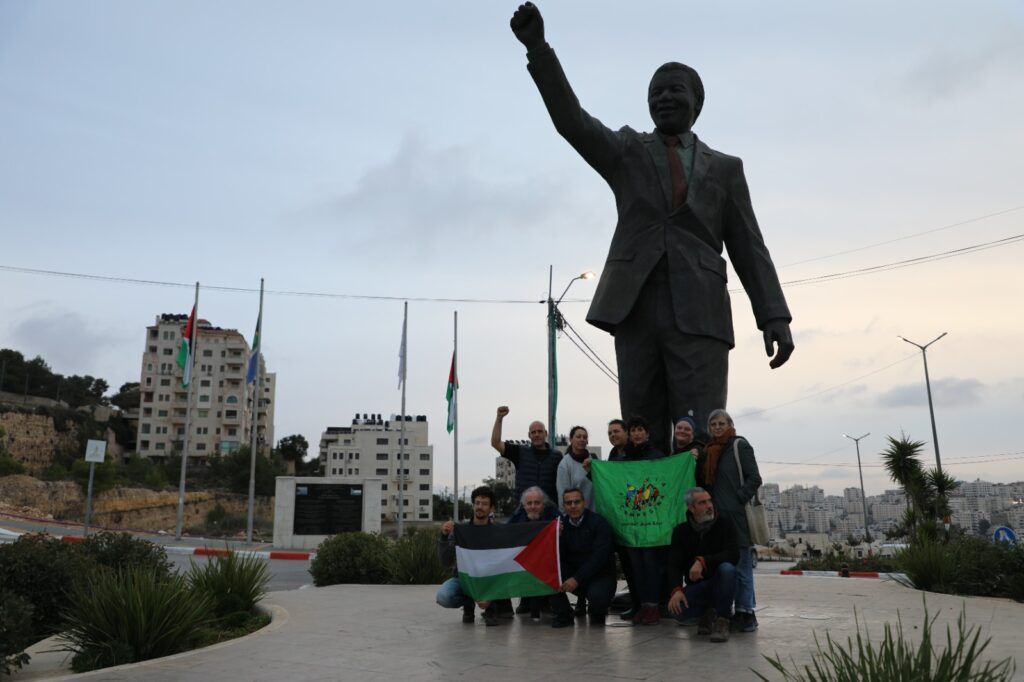La Via Campesina Delegation Visited Palestine in December 2024: Notes from their Daily Diaries [Part – 4]

From December 8 to 18, 2024, a delegation of nine peasant-farmers traveled to Palestine, in the West Bank. All their organizations are part of the international peasant movement La Via Campesina, which also includes the Palestinian organization UAWC (Union of Agricultural Work Committees) as a member. For many years, La Via Campesina has stood in solidarity with Palestinian peasants in their struggle against colonization, land and water grabs, and the numerous human rights violations they endure. However, since 2023, the scale of massacres in Gaza and the openly genocidal intentions of the far-right Israeli government have led La Via Campesina to intensify its solidarity work with Palestinian farmers. Organizing a delegation visit to the West Bank thus gradually became an imperative. Due to the obstacles posed by the Israeli state for accessing Palestinian territories, all delegates were European, hailing from the Basque Country, Galicia, Italy, Portugal, Ireland, and France. We, Fanny and Morgan, are both small-scale farmers, based in Ardèche and Brittany, and members of the Confédération Paysanne. The following texts are our journal from these ten days, which profoundly changed our lives and worldview. [ Access all the notes here].
Day 5 – Ramallah
Morgan
After three very intense days, our small delegation catches its breath, and we try to digest the emotions and information received so far. After breakfast, we take the time to discuss the moments that have marked us, the questions that beset us, and the follow-up to this visit to Palestine. At 11am, we have an appointment at the UAWC office for a debriefing. We reflect upon the proposals that we could make to La Via Campesina to strengthen their actions to support the Palestinian peasantry.
Our group then goes to the museum dedicated to Mahmoud Darwish, the great Palestinian poet, whose tomb is right next to the Mouqata’a, the building made for the Palestinian Authority. It seems significant to me that the “great man” of this nation is a poet, a man of letters who knew how to find the right words to describe human suffering, the pain that is both universal and at the same time rooted in the experience of exile and loss that is so specific to the Palestinians.

The delegation then visits the statue of Nelson Mandela, who in 1997 proclaimed “Our freedom is incomplete without the freedom of the Palestinians”, and then in 1999 “Any talk of peace will remain hollow as long as Israel continues to occupy an Arab territory”. He is a hero here.
Fanny has a very close friend in South Africa and she knows that Mandela is not flawless. We resume the discussion about the risk of idealizing political leaders too much. Fuad tells us about Yasser Arafat, about the intifada of the late 1980s, which forced Israel to negotiate the Oslo peace agreements. Of course, many Palestinians felt this wind of hope. In the big cities that were under the administration of the Palestinian Authority, people felt a wind of freedom: suddenly, they could wave the Palestinian flag without risking imprisonment, cultural centers proliferated, trade with other countries flourished, the economy was boosted, some Palestinians succeeded in business, and a thriving middle class emerged. But for the rural people who lived in Zone C, the Oslo agreements had a bitter taste. They remained under the thumb of the Israeli military administration, and contrary to promises of rapid decolonization, the number of settlements grew faster than ever.

We then return to the UAWC offices where the team must participate in the online presentation of the American Alliance for Food Sovereignty award, of which the “Arab Countries and North Africa” region of La Via Campesina is the winner for 2024. An award is also given to an organization based in the United States, and this year it is given to an association that develops urban agriculture in working-class neighborhoods in Chicago. The young black American woman who speaks cannot hide her emotion about the situation in Palestine and Gaza.
In the chat of the online conference, the participants introduce themselves by mentioning that they come from the “unceded territories of …”, a way of acknowledging the violence of American colonial history and the rights of indigenous peoples. The award ceremony ends with traditional Native American music. After the end of the online conference, our delegation and the Palestinian friends discuss this strange ceremony. We couldn’t help but burst out laughing at certain moments because the efforts to copy Native American traditions seemed clumsy to us, and at the same time, we have the impression that this reflects a real willingness of part of the American population to no longer ignore its past of violence and extermination, and to try to build other types of relationships with other peoples. From our side, in Europe, we also have work to do to disentangle ourselves from our history as dominants and build the path to internationalism.
In the evening, Tamam surprises us by inviting us to her home, or rather to her parents’ home, in the Al-Bireh neighborhood. She is the youngest of the team and she doesn’t mince her words! We arrive in front of a beautiful and opulent house. The interior is similar to a Western house, with a large, fully equipped kitchen. We meet her sister, her husband and a cousin who lives in the neighboring house. We had been promised a “light dinner” and we discover a real feast on the table. Tamam explains to us that her parents have gone to the United States to visit her older sister. She says that her family has always traveled a lot. Her grandfather was a rather adventurous merchant who would sneak onto boats that went to the Americas with a few goods and pretend to be a sailor. The whole family has a dual Palestinian and American passport and the five children spent their early years in the United States. Tamam decided to return to live permanently in Palestine when she was 16. Her older sister and her husband have just finished a doctorate in psychology there and have also decided to live in Ramallah. Tamam overplays the role of the spoiled youngest one in the family. But behind the laughter and jokes, she impresses us with her courage and determination.
Between a few mezzes and glasses of the famous Taybeh beer, Carlos suggests that we listen to a song from the Carnation Revolution in Portugal. We are all moved, tears in our eyes. We continue with traditional songs from our different countries: I suggest a Breton dance to the sound of the Ramoneurs de Menhirs, after which our Palestinian hosts teach us a Palestinian dance. It is Aghsan, who has long been part of a professional dance troupe, who shows us the steps. We then move on to the Tarantella from Southern Italy. Then Kelo makes us listen to an Andalusian song about farm workers. Tamam praises the improvisational talents of her grandmother who, she says, invented rap. We laugh a lot, we sometimes cry. The popular cultures of the world echo each other: song, dance, poetry, universal languages of humanity.
Fanny
Two days ago, walking back up from the city center at night, we bought some fruit at a stand in the street. Right next door, there was an old man selling delicacies, a kind of Palestinian churros. He was disappointed that we didn’t buy any from him. But we promised to come back.
A promise is a promise, so we go back and fill up our bag. They are long doughnuts, full of sugar syrup that drips, called Karabej Halab. I inevitably put this syrup everywhere, incapable of biting into them gently, like a child in too much of a hurry!
We are all real gourmands, both the peasant comrades of La Via Campesina and our friends from UAWC, we never miss an opportunity to taste everything. We are gourmands and we like to laugh. Despite the situation, or maybe because of it, we laugh a lot. We oscillate between moments of great sadness, spite, anger, incomprehension and real moments of joy, humor, laughter. It had been a long time since I had laughed so much.
Maybe intuitively, it is our way of thwarting the abomination of everything we see, it is our way of expressing our life force together. Because that is a certainty – our capacity to laugh, to love, to meet, to build bonds, to share… They’ll never be able to take that away from us.
The incredible evening at Tamam’s house is a beautiful proof of it. We cried, danced, laughed and sang together. We trusted each other, too. We shared a simple and magnificent complicity. And several times during the evening, I told myself that we were living a truly precious moment. We left feeling full of admiration for these brilliant and strong young women, who decided to stay or return to Palestine, to resist and defend who they are, where they come from and their dream of a free country.
